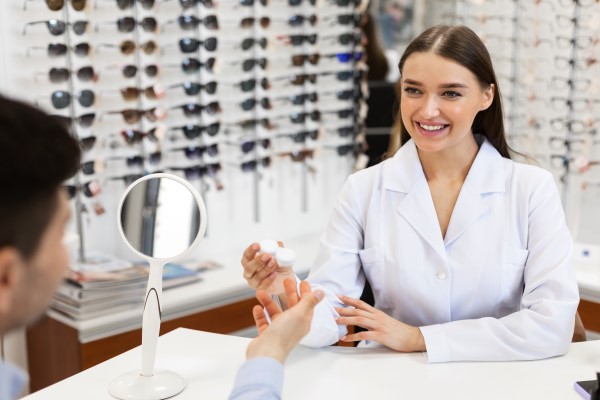An Optometrist Explains How to Protect Your Eyes

According to an optometrist, the best way to deal with eye-related concerns is to reduce the risk of them developing or worsening in the first place. Although certain eye conditions are hereditary and unpreventable, there are daily habits that you can implement to help ensure healthy eyes and reduce the risk of eye-related diseases and conditions from worsening or leading to other issues. In this review, we discuss several effective ways to protect your eye health and vision for the long term.
How to protect your eyes for the long term
Here are several key ways to improve one's eye health and maintain healthy eyes in the long run. A personalized plan is recommended for best results, which should involve meeting with an optometrist. That said, implementing these eye protection techniques is a great place to start for keeping your eyes healthy.
Do regular eye exams
Every person’s eyes are unique. As such, there is not one universal method for protecting the eyes. Instead, it is vital to utilize a personalized eye care approach. This begins with an exam from a licensed optometrist. They can examine the patient's eyes and detect any concerns that need to be addressed. They can also put together a prevention plan that helps the patient maintain healthy vision and eyes that feel good throughout the day.
Keep the eyes clean
It is essential to keep the eyes as clean as possible. This may involve limited (and careful) use of beauty products. Makeup in particular can clog the oil glands, which can prevent the eyes from producing enough oil for optimal eye health. Additionally, certain preservatives in makeup can break down and enable bacteria growth, which can lead to eye infection, irritation, and other eye-related concerns. Patients should be sure to wear protective eyewear if they work in areas with dust and other debris that could cause their eyes to become dirty and irritated.
Ensure that the eyes are lubricated
Tears play an integral role in keeping the eyes lubricated, which helps with good eye health and vision. After age 50, tear production begins to decrease. Additionally, certain conditions like diabetes and rheumatoid arthritis can cause the eyes to dry out more than they should. This produces a feeling of stinging and burning in many cases. The good news is that prescription lubricant eye drops can help keep the eyes lubricated as the patient grows older and help them maintain optimal eye health.
Eat vision-protecting foods
One's diet affects the eyesight and overall eye health. It can also reduce the risk of conditions like macular degeneration from developing and/or progressing. Nutrient-rich foods are great at protecting eye health and vision. Specifically, the foods that experts believe contribute to healthy eyes and vision are:
- Carrots
- Fish
- Vegetables
- Leafy green vegetables
- Citrus fruits
- Beans
- Sweet potatoes
- Butternut squash
- Red bell peppers
More generally, the American Academy of Ophthalmology recommends eating a diet low in fat and rich in fruits, vegetables, and whole grains to preserve one's vision. Foods that contain omega-3 fatty acids are good for eye health, such as tuna and sardines.
Supply eye health with vitamins
Vitamins play a crucial role in protecting eye health. Specifically, daily doses of zinc, vitamin C, vitamin E, copper, and beta-carotene may help slow the progression of conditions like macular degeneration. The vitamins that work best for a patient depend on their specific symptoms. For instance, if a patient struggles with dry eye, omega-3 fatty acids, vitamin A, and vitamin D may be recommended by an optometrist.
Have consistent sleep and limit screen time
A consistent sleep schedule is essential. Fatigue can contribute to dry eye, redness, inflammation, and other eye-related concerns that could worsen over time. Additionally, it is recommended to limit digital screen time and take plenty of breaks away from the computer screen.
Stop smoking
According to the National Eye Institute, smoking can cause macular degeneration, cataracts, and damage to the optic nerve. This is believed to be due to the toxins that are in cigarettes and other smoking-related products. These toxins can restrict natural blood flow to the eye and cause oxidative stress.
Contact our optometry office today to schedule a visit
We help patients protect their eye health in the long term at our optometry office. If you are dealing with eye-related concerns and/or have not seen an optometrist in more than a couple of years, we recommend visiting with our friendly and professional team today.
Get more information here: https://www.texasoptical.net or call Texas Optical at (214) 771-7333
Check out what others are saying about our services on Yelp: Read our Yelp reviews.
Recent Posts
The selection of eyewear feels significantly easier when the styles and craftsmanship of Versace eyewear enters the conversation, since bold lines and iconic detailing create an instantly recognizable look. Versace represents the intersection of Italian fashion and Greek mythos, blending confident glamour with symbolism through its signature Medusa logo. The brand is widely associated with…
Many people who work in construction or laboratories wear safety glasses to protect their eyes during the day. However, keeping your eyes safe extends beyond hazards in the workplace. There is a wide variety of household chores and hobbies for which you should wear eye protection. When used consistently, safety glasses help create a safer…
Transitions lenses combine style and convenience to support clear vision without switching between regular glasses and sunglasses. While they were often considered unfashionable in days past, times have certainly changed. Today, transition lenses can be fashionable, chic, and a reflection of your personal style. When designing a pair for you, an optometrist will look at…
Dry eye treatment is important when occasional irritation becomes ongoing discomfort that interferes with daily activities. Many individuals experience dryness, burning, or a gritty feeling in the eyes from time to time. However, when symptoms start to affect reading, screen use, or time outdoors, a structured approach to diagnosis and care helps protect comfort and…


